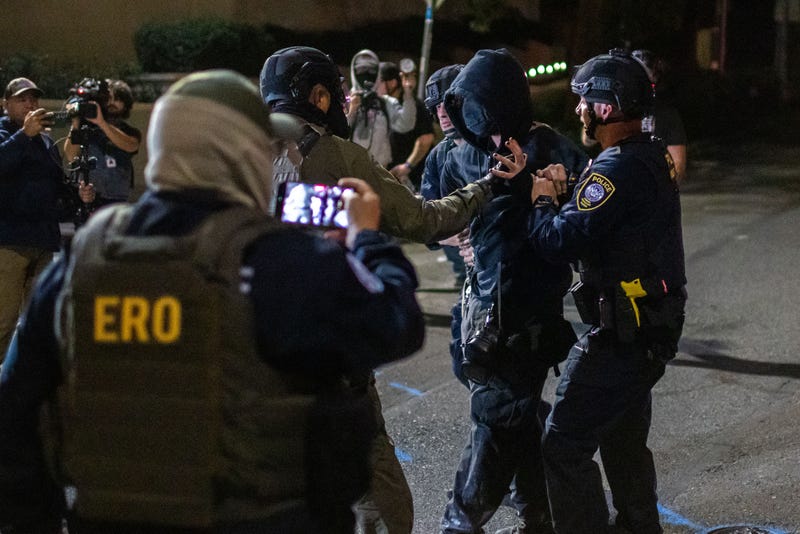
President Donald Trump’s deployment of the National Guard in Illinois faces legal scrutiny Thursday at a pivotal court hearing, a day after a small number of troops began protecting federal property in the Chicago area.
U.S. District Judge April Perry will hear arguments over a request to block the deployment of Illinois and Texas Guard members. Illinois Gov. JB Pritzker and local officials strongly oppose the use of the Guard.
Some Guard troops could be seen behind portable fences at a U.S. Immigration and Customs Enforcement building in Broadview, outside Chicago. It has been the site of occasional clashes between protesters and federal agents, but the scene was peaceful, with few people present.
Police noticed troops apparently sleeping “undisturbed” in vans Wednesday night, Broadview said in a statement.
“We hope that they will extend the same courtesy in the coming days to Broadview residents who deserve a good night’s sleep, too," the village said.
Guard members from Texas and Illinois arrived this week at a U.S. Army Reserve Center in Elwood, southwest of Chicago. All 500 are under the U.S. Northern Command and have been activated for 60 days.
The Guard members are in the region to protect ICE enforcement buildings and other federal properties and law enforcement, according to Northern Command.
Chicago and Illinois filed a lawsuit Monday to stop the deployments, calling them unnecessary and illegal. Trump has portrayed Chicago as a lawless “hellhole” of crime, though statistics show a significant recent drop in crime.
In a court filing, the city and state say protests at the ICE building in Broadview have “never come close to stopping federal immigration enforcement.”
“The President is using the Broadview protests as a pretext,” they wrote. “The impending federal troop deployment in Illinois is the latest episode in a broader campaign by the President’s administration to target jurisdictions the President dislikes.”
The Republican president said Wednesday that Chicago Mayor Brandon Johnson and Pritzker, both Democrats, should be jailed for failing to protect federal agents during immigration enforcement crackdowns.
Also Thursday, a federal appeals court was scheduled to hear arguments over whether Trump had the authority to take control of 200 Oregon National Guard troops. The president had planned to deploy them in Portland, where there have been mostly small nightly protests outside an ICE building. Like in Illinois, state and city leaders insist troops are neither wanted nor needed there.
U.S. District Judge Karin Immergut on Sunday granted a temporary restraining order blocking the deployment of Guard troops to Portland. Trump had mobilized California troops for Portland just hours after the judge first blocked him from using Oregon's Guard.
Immergut rejected the president's assertions that troops were needed to protect Portland and immigration facilities, saying “it had been months since there was any sustained level of violent or disruptive protest activity in the city.”
Two dozen other states with a Democratic attorney general or governor signed an appeals court filing in support of the legal challenge by California and Oregon.
The nearly 150-year-old Posse Comitatus Act limits the military’s role in enforcing domestic laws. However, Trump has said he would be willing to invoke the Insurrection Act, which allows a president to dispatch active duty military in states that are unable to put down an insurrection or are defying federal law.
Trump previously sent troops to Los Angeles and Washington, and a small number this week began assisting law enforcement in Memphis, Tennessee.
Those troops are part of the Memphis Safe Task Force, a collection of about a dozen federal law enforcement agencies ordered by Trump to fight crime in the city. In contrast to others, Tennessee Republican Gov. Bill Lee supports using the Guard.
___
Associated Press writers Gene Johnson in Seattle, Konstantin Toropin in Washington and Geoff Mulvihill in Philadelphia contributed to this report.